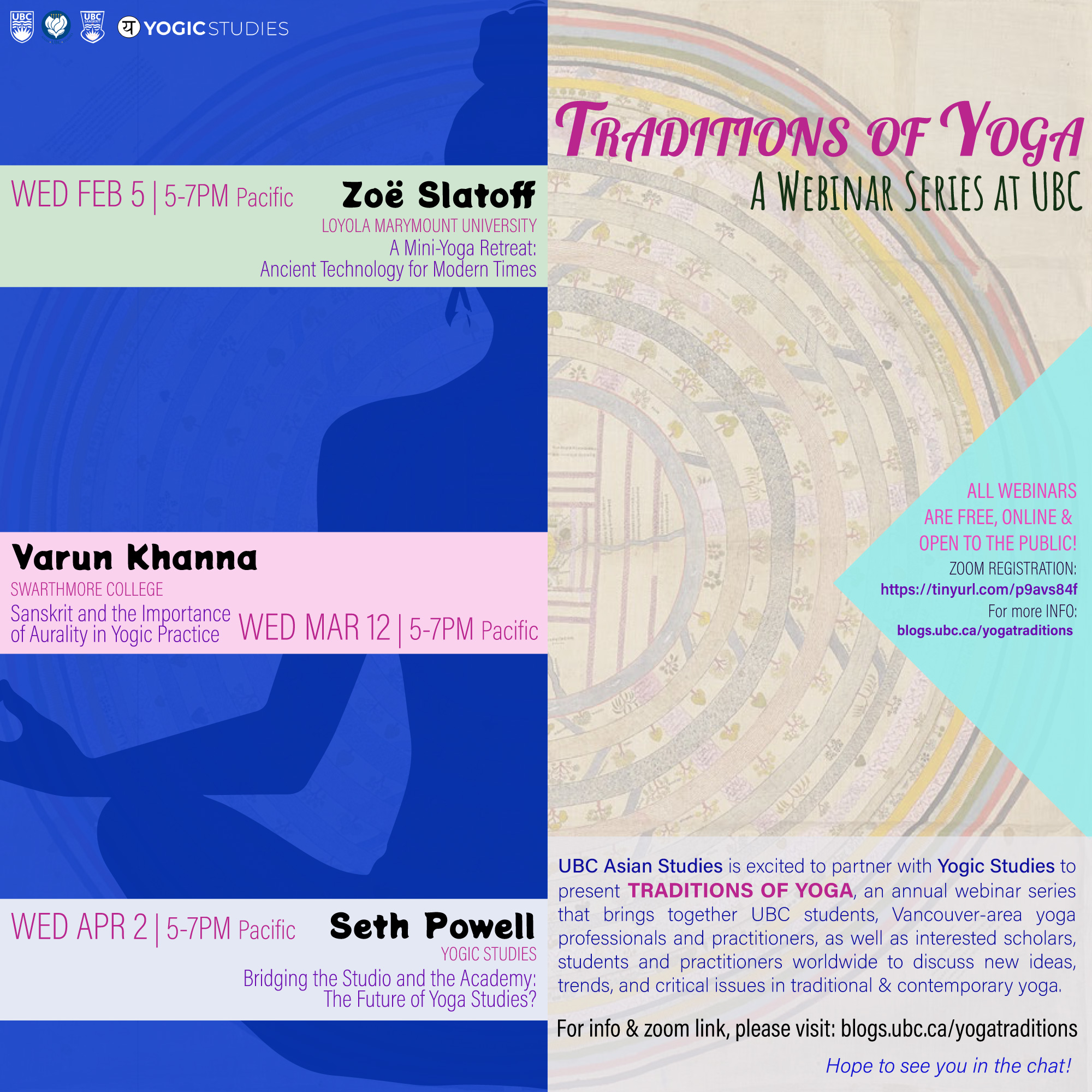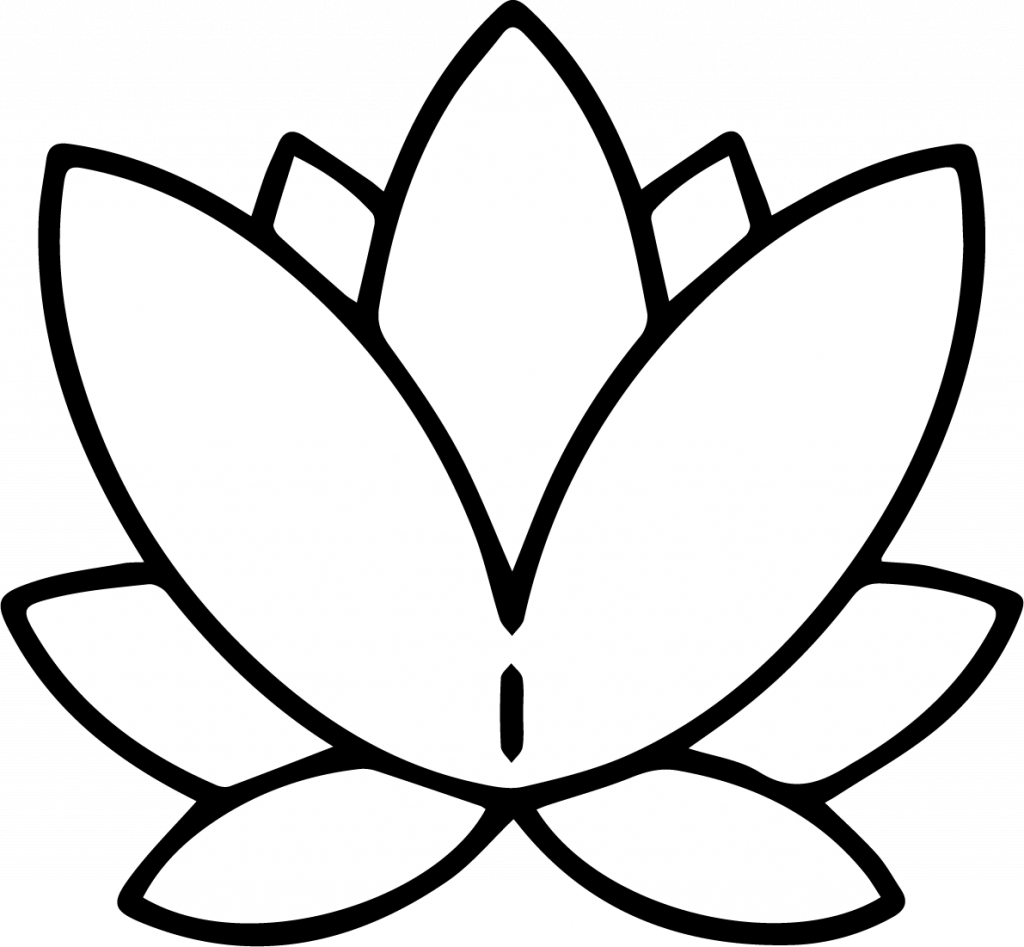TRADITIONS OF YOGA 2025
ZOOM REGISTRATION LINK:
Use this link to register for the webinars and get the link to join on Zoom!

UBC Asian Studies is excited to partner with Yogic Studies (www.yogicstudies.com) to present Traditions of Yoga, an annual webinar series that brings together UBC students, Vancouver-area yoga professionals and practitioners, as well as interested scholars, students and practitioners worldwide to discuss new ideas, trends, and critical issues in traditional & contemporary yoga.
The series is held annually in conjunction with a course at UBC, ASIA 210: Traditions of Yoga. We are pleased to open the doors of our classroom and invite you to join us as we welcome noted scholars to discuss how and why they study yoga through historical, cultural, and critical lenses.
All events are held LIVE at UBC and live-streamed on Zoom. Recordings will not be available, but we are planning to release a summary video at a later date.
TO REGISTER for the ZOOM Livestream, please visit:
This event is presented by the Sanskrit Program at UBC Asian Studies, in partnership with Yogic Studies.




FULL SCHEDULE:
February 5 | 5-7PM Pacific TIme
Zoë Slatoff (Loyola Marymount University)
A Mini-Yoga Retreat: Ancient Technology for Modern Times
Traditionally, yoga practice was intended as a way of withdrawing from the external world to discover one’s true internal self. In our modern world, where we are constantly overstimulated, these ancient techniques are still very relevant and powerful. In this mini-retreat (ironically conducted through Zoom), we will look closely at a selection of Sanskrit verses from yoga texts and do some simple breathing and meditation practices to have an embodied experience of yoga and build a bridge between premodern studies and modern practice.

BIO:
Zoë Slatoff (PhD, Lancaster Univ.) is the Clinical Professor of Yoga Studies and Sanskrit at Loyola Marymount University in Los Angeles. Her area of specialization is the interface between the Advaita Vedanta school of philosophy and yoga practice within the Aparokṣānubhūti, a text attributed to Ādi Śaṅkara. She taught for many years at her yoga shala in New York, Ashtanga Yoga Upper West Side, and has published a Sanskrit textbook designed for yoga practitioners, Yogāvatāraṇam: The Translation of Yoga.
March 12 | 5-7PM Pacific Time
Varun Khanna (Swarthmore College)
Sanskrit and the Importance of Aurality in Yogic Practice
There has been substantial debate about postural yoga, the importance of āsanas and prāṇāyama, whether it is religious or not, and the dominance of whiteness in yoga spaces, but less attention has been placed on aurality – not simply saying Sanskrit phrases, but what is supposed to be happening to the practitioner through the recitation of those phrases. Through this talk I hope to complexify the conversation about the use of Sanskrit in the yoga space by discussing the nature of aurality in traditional yoga philosophy and practice.

BIO:
Varun Khanna (PhD, Cambridge) is currently Visiting Assistant Professor of Classics (teaching Sanskrit) at Swarthmore College. He completed his MPhil in Sanskrit and PhD in Hinduism from the University of Cambridge. His current research lies at the intersection of Sanskrit and Social Justice.
April 9 | 5-7PM PDT
Seth Powell (Yogic Studies)
Bridging the Studio and the Academy: the Future of Yoga Studies?
With millions of yoga practitioners rolling out their sticky mats daily, the global appetite for academic knowledge in Yoga Studies is immense. How can, and should, scholars of yoga and South Asian religions position themselves in relation to the global yoga community? What professional opportunities are available for the emergent scholar-entrepreneur? In this talk, I will reflect on my own journey of founding Yogic Studies in 2018 as an educational platform that seeks to bridge the gap between the academic study of yoga and the global communities of yoga practice. What might the success of this venture say about the current state and future of Yoga Studies, and higher education more broadly?

BIO:
Seth Powell (PhD, Harvard) is a scholar of Indian religions, Sanskrit, and yoga traditions. His dissertation comprised a critical edition, translation, and detailed study of a 15th-century Sanskrit yoga text from south India known as the Śivayogapradīpikā—which uniquely combines yoga, ritual, and devotion. He also works on the visual and material culture of yoga in premodern India, uncovering yoga’s past through temple sculptures, with a special focus on the Deccan region. Seth is the founder and director of the online educational platform Yogic Studies, which provides extensive courses and training in Yoga and South Asian Studies to students worldwide. He is also the host of the Yogic Studies Podcast.